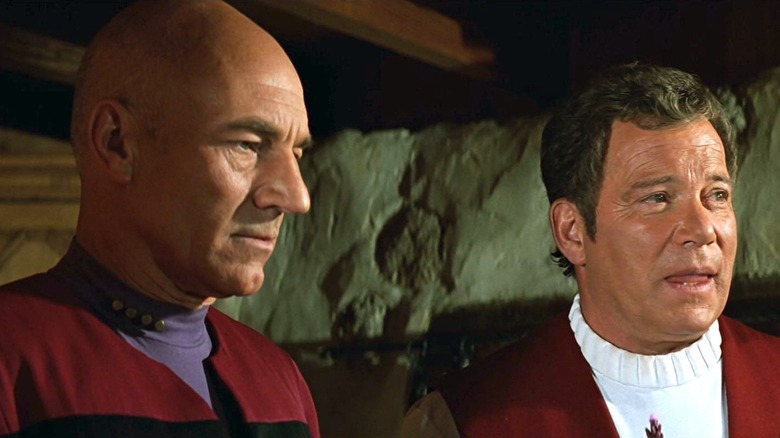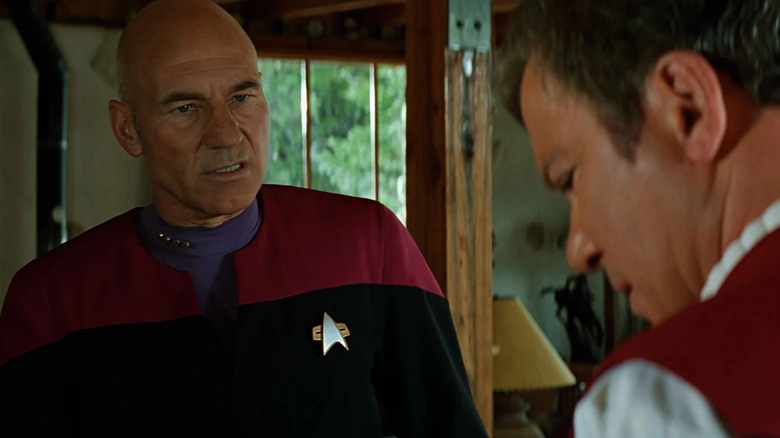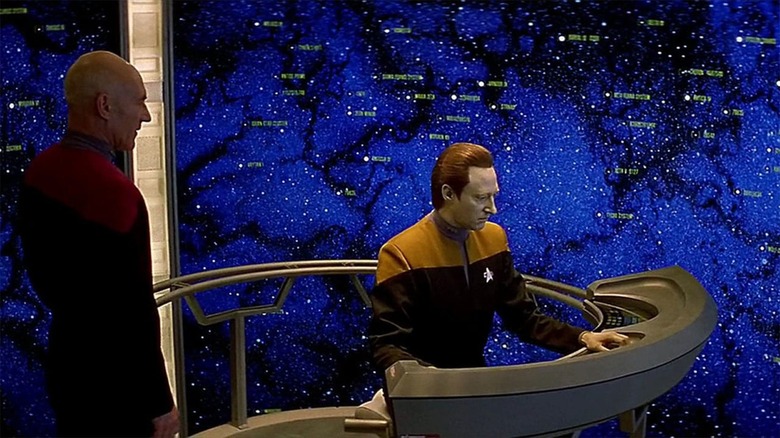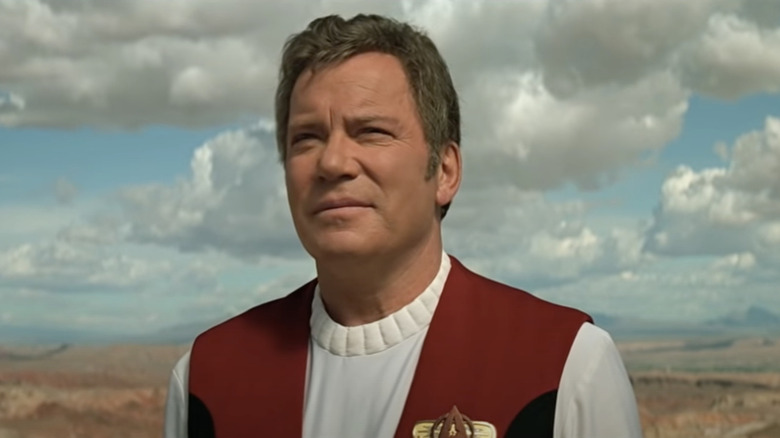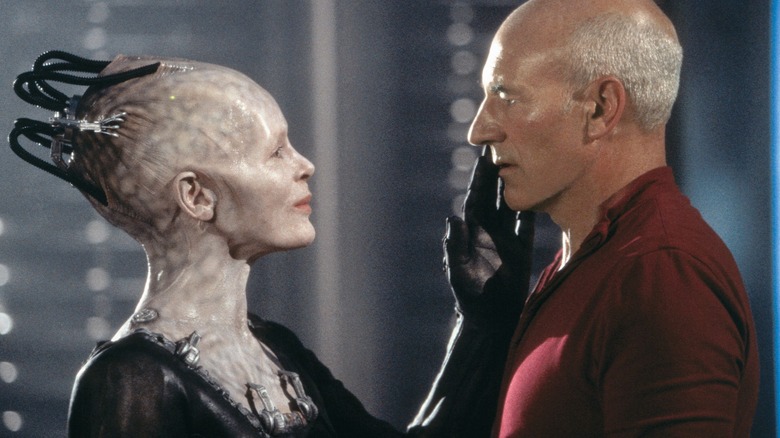Star Trek: Generations Is The Most Useless Star Trek Movie By A Lightyear
The series finale of "Star Trek: The Next Generation," called "All Good Things...," filmed from March 11 to April 5, 1994. The episode followed Captain Picard (Patrick Stewart) as he had become unstuck in time, "Slaughterhouse-Five" style. Without warning, Picard would find himself thrown back in time seven years, just prior to the events of the "Next Generation" pilot episode. Then, just as unexpectedly, he would be thrown several decades into the future where he was an old man suffering from a degenerative brain ailment. Then, zip, back to the present. In all three time frames, Picard found himself needing to investigate a mysterious spatial phenomenon that seemed to be growing larger ... as it moved backward through time.
The trickster god Q (John De Lancie) informs Picard that the spatial phenomenon was going to destroy all of humanity ... and that Picard somehow created it. "All Good Things..." was an epic tale to wrap up an amazing sci-fi series.
While "All Good Things..." was still being filmed, shooting had already commenced on "Star Trek: Generations," the show's first theatrical outing. The final episode of the show aired on March 23, 1994, and the film hit theaters the following November. Not only was that a massively quick turnaround, but it put "Generations" in an awkward position. How was it going to follow such an amazing series finale?
As it turns out, poorly. "Generations" adopted an incredibly disappointing ethos, devoting itself to limp fan service that, frankly, no fan had asked for. "Generations" was determined to have Picard and Captain Kirk (William Shatner) meet each other in person in a misguided attempt to "pass the torch." After seven years of "Next Generation," though, and the glories of "All Good Things..." a torch was no longer necessary.
"Generations" was useless.
Passing the torch for no reason
Note that "Star Trek: The Next Generation" had already been on the air for seven seasons by 1994. It had handily outstripped the original "Star Trek" by four years and had created its own expanded mythos, its own tone, and its own themes. The characters on "Next Generation" were independent entities with their own arcs, free of any pesky notions of "legacy." The series was set about 80 years after the events of the original series, leaving it deliberately distanced from its forebear; this wasn't going to be a series about fandom or nostalgia. It was something new.
But even for those who still thirsted for linking material between the original "Star Trek" and "The Next Generation," the showrunners still threw a few bones to fans. Leonard "Bones" McCoy (DeForest Kelley) appeared in the "Next Generation" pilot as a very old man, proving to viewers that this was indeed the same universe as the original "Star Trek." In the show's fifth season — right after the death of Gene Roddenberry — Spock (Leonard Nimoy) appeared in a notable two-part episode as a major character who went on a mission of diplomacy with Picard and Data (Brent Spiner). And then, in the sixth season, Scotty (James Doohan) was pulled out of a transporter beam after being suspended in time for several decades. He recreated the original Enterprise bridge on the holodeck, and Picard walked around in it. "Next Generation" gave us occasional sips from the nostalgia cup. And Trekkies were perfectly sated.
So the thought of getting Picard and Kirk together on screen was no longer needed. I can assure younger readers: Trekkies in 1994 weren't asking for a meeting between the characters. Picard already had the torch. It needed no passing.
Will Trekkies get it?
One can almost hear the worried Paramount executives spitballing their ideas for "Generations" over a coffee table in Malibu. How can we, they ask between bites of croissant, have a "Star Trek" movie without Captain Kirk? True, Trekkies have embraced "Next Generation" on TV, but would a broad, mainstream audience come to see a "Star Trek" movie unless it had at least some of the original cast in it?
That kind of executive fretting led to one of the limpest stories in "Star Trek" movie history, and laid out a plan of attack for a feature film that it really, really didn't need.
Eighty-seven years ago, Captain Kirk was on board the maiden voyage of the U.S.S. Enterprise-B as an observer when a mysterious, traveling, destructive energy ribbon tore through the solar system. It blew a hole in the ship's hull and snatched up Kirk. In the "present" of "Generations," the ribbon is passing nearby again. An evil doctor named Soren (Malcolm McDowell) has set about a plan to destroy multiple stars, changing gravitational fields, and "steering" the ribbon into himself. It seems that the ribbon — called the Nexus — is kind of like Heaven. People swept up inside of it live out their warmest dreams. Naturally, Picard will be swept up inside. Time has no meaning in the Nexus, so Kirk and Picard technically arrived in Heaven at the same time. Picard leaves his Paradise of domesticity to enlist Kirk for a punch-up.
The two men travel back in time a few hours so they can beat up Dr. Soren together. Kirk dies in the process.
Trekkies didn't necessarily want to see Kirk and Picard fighting side-by-side, but even if they did, the fight was lackluster at best.
Kirk vs. Picard: Who's Better?
Comparing Kirk to Picard had been, at least since 1987, one of Trekkies' favorite subjects of debate. Who was the better captain? Who would survive in a battle scenario? Who was the more judicious character? If one were to transpose Kirk and Picard into each other's shows, how would they fare? The fan conversations were endless and fun.
But ultimately, Trekkies are an egalitarian lot. "Star Trek," and especially "Next Generation," always lived by an ethos of multiculturalism. No one ship/captain/species was any "better" or "worse" than any other. They all merely have different viewpoints and perspectives. As such, many Trekkies were instantly able to accept both Kirk and Picard as separate entities who lived in their own universes and by their own respective codes of conduct. Kirk was an instinctual leader who took advice from trusted advisors. Picard, while more aloof, always shopped ideas around, letting his crew ply their expertise. Kirk had a reputation for being reckless, while Picard typically went by the book.
Having clearly defined both characters in their heads, most Trekkies no longer needed to see Kirk and Picard meet. "Star Trek" had moved well beyond Kirk by 1994. Indeed, "Star Trek: Deep Space Nine," the first series created without Gene Roddenberry's input, had debuted the year before. "Trek" was sailing on into new territory, forging a path and talking the franchise to new heights.
"Generations," meanwhile, latched itself onto themes of legacy and faltered as a result. Compared to "All Good Things...," it was dull and unexciting and decidedly less epic. Congratulations, Paramount. You passed a torch from Kirk to Picard, not realizing that the torch was already passed to Captain Sisko (Avery Brooks).
And it was all downhill from there
"Generations" set a bad precedent. The "Next Generation" movies repeatedly fell back on "safe" ideas and dumbed-down genre tropes in a misguided attempt to make them seem cinematic. None of the "Next Generation" movies were comfortable enough to tell heady stories — like on the small screen — rich in philosophy and science talk. Instead, we got action film after action film starring a cast of characters that wasn't well suited to action. 1996's "Star Trek: First Contact" redefined the Borg to be a species of sweaty, plotting animals — rather than cold, emotionless machines — ensuring they were less threatening. It also declared that Picard was still so traumatized by his time with the Borg that he was willing to become a revenge monster. This stood counter to the therapy and healing he had already displayed on the TV series. It was a PG-13-rated film about death and shooting.
1998's "Star Trek: Insurrection" repeated the story from the episode "Who Watches the Watchers?," but in a far less dynamic way and on a very small budget. And 2002's "Star Trek: Nemesis," the lowest-grossing of all "Trek" movies, was a simple "Wrath of Khan" rehash. It was "Generations" that set a precedent for uninteresting "Star Trek" films.
"Generations" was not the time to play it safe. It was the ideal time to do something oblique and daring, enticing audiences with an all-new story that couldn't be done on the small screen. But Paramount insisted on safety, and the trend began. Each movie after that was safe to a fault, fearing that audiences wouldn't watch "Star Trek" unless it was more like "Star Wars."
Fingers crossed for a "Star Trek" movie that's not an action movie.
